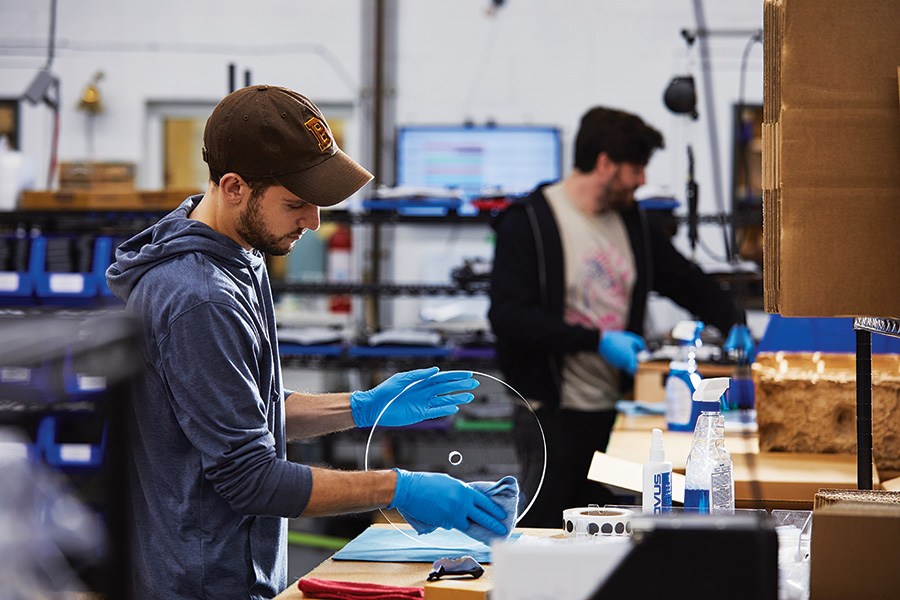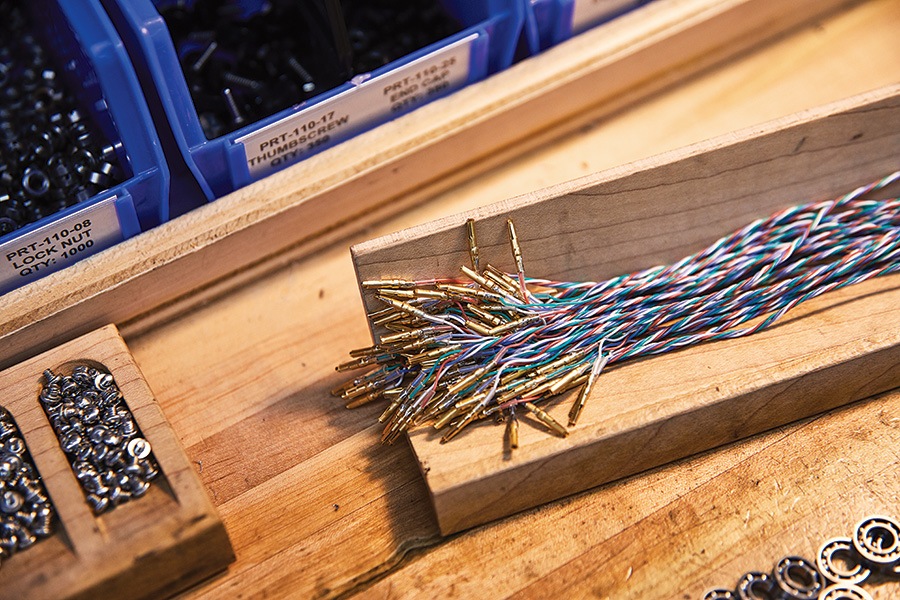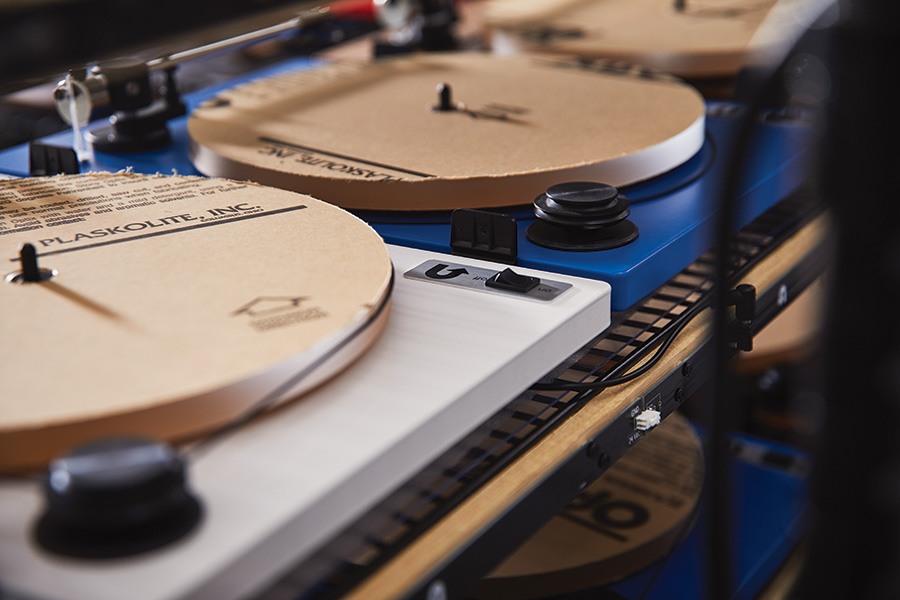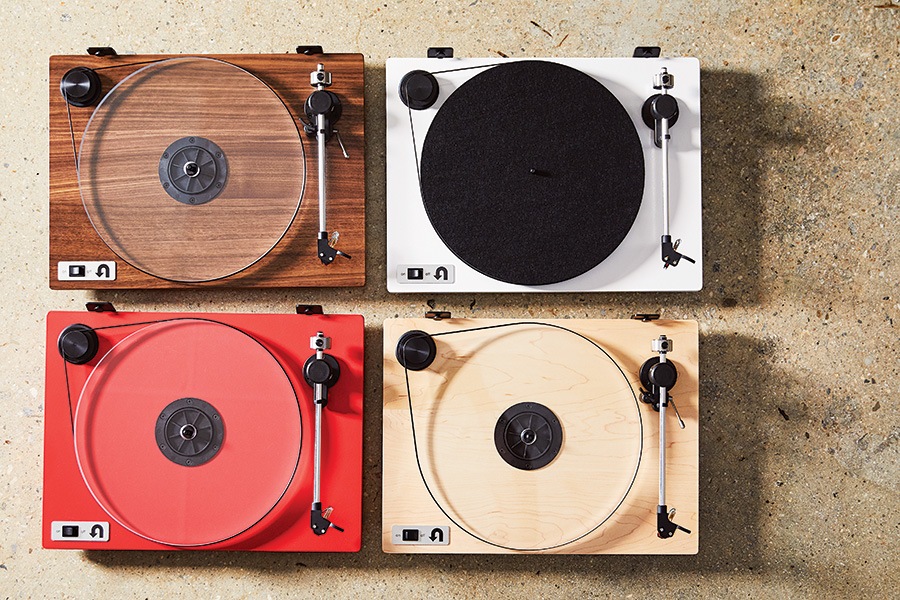U-Turn Audio Is on a Mission to Produce High-Quality Custom Turntables
Learn how the Woburn company cranks out record players that look good and sound even better.

Photo by Pat Piasecki
There’s something about vinyl that digital streaming just can’t top. Maybe it’s the tactile nature of setting a needle onto a record, or the soft crackling as that first song comes to life—whatever it is, listening to a record on a turntable delivers a distinctly engaging audio experience.
Unfortunately, not all turntables are created equal. Some are too low-grade (there’s a fine line between atmospheric crackling and drown-out-the-song crackling), while others seem too complex for everyday use (what do you even do with five USB ports?). The perfect middle ground—a.k.a. an approachable, high-quality machine with clean lines to boot—is where U-Turn Audio comes in. Since 2012, the Woburn-based outfit has been on a mission to produce sound-centric analog record players for vinylheads and dilettantes alike. “Vinyl tends to scare a lot of people off because they think it’s complicated,” says Ben Carter, one of U-Turn’s three cofounders. “We want to get rid of that [misconception] and bring more people into the hobby [of collecting vinyl], where music is something you actively listen to and you pursue quality listening experiences.”

A phono preamp printed circuit board allows customers to hook their turntable up to speakers without needing an external amplifier. / Photo by Pat Piasecki

A production worker wipes down an acrylic platter for packaging. / Photo by Pat Piasecki

Raw materials lie in wait at an assembly station. / Photo by Pat Piasecki

Once built, a tonearm is balanced and calibrated before it can be installed on a turntable. / Photo by Pat Piasecki
U-Turn sprang to life in 2011, after longtime friends Bob Hertig and Pete Maltzan had a There has to be a better way! moment with a turntable that was high on bells and whistles but low on sound quality. With Carter, a friend who was looking to start a business, they launched a Kickstarter in 2012 to manufacture what they named the “Orbit” turntable, a machine that combined a minimalist aesthetic with high-performance playback. Within a month, they’d almost quadrupled their $60,000 goal. Nowadays, U-Turn offers customers three levels of the standard “Orbit” turntable: basic, plus, and special. Thanks to varying degrees of upgrades and customization (preamp versus no preamp; a hardwood versus a powder-coated base), Hertig says, “One turntable platform kind of does it all.”
U-Turn has sold more than 70,000 machines to date. All are hand-assembled on-site in Woburn, with materials arriving daily from places like Minnesota (powder-coated MDF plinths), Connecticut (machined metal parts), and Asia (motors). True to U-Turn form, everything they use is top-shelf. “About 50 percent of our revenue goes back into parts and physical-goods inventory,” Carter says. That’s a pretty high amount, he notes, but it reflects the quality of the parts they’re using.

U-Turn hand-assembles its turntables in a 5,000-square-foot shop in Woburn. / Photo by Pat Piasecki

Recently built turntables “burn in” before final inspection. / Photo by Pat Piasecki

With the “Orbit” turntable’s hundreds of configurations, Carter says, “Everyone wants their own color and to choose all of the different features. The real plus is that it does what the more expensive turntables do, but for a fraction of the price.” / Photo by Pat Piasecki

To check speed consistency and accuracy, a staffer listens to a record on a new machine. / Photo by Pat Piasecki
Putting all of them together takes about 60 minutes. To begin, an assembly technician grabs a plinth, or base, and uses a computer numerical control (CNC) machine to drill a model-specific hole pattern, which allows workers to affix a circuit board and feet. From there, a house-built machine applies a U-Turn nameplate onto the plinth. Meanwhile, workers add hinges that will later connect to a cover, and then install a power switch.
Next, staffers attach the main bearing house and shaft, which help spin the record, followed by the tonearm—the pre-built lever that presses into and plays the record. As soon as the tonearm is balanced and calibrated, a technician solders it onto the plinth. Finally, the team installs the wiring and the machine’s “drive system”: the spindle, motor, platter, and belt. At this point, the turntable is fully functional. Once it goes through quality control, each turntable travels to the “burn in” rack, where it hooks up to a power source and spins for 90 minutes. If it passes muster, technicians inspect the machine one final time before slapping a cover on it and packaging it for shipping.

“I don’t think there’s ever going to be a stopping point,” Hertig says. “We’re going to keep doing what we’re doing until everyone has a turntable.” / Photo by Pat Piasecki
The bulk of U-Turn’s business is direct-to-consumer. You can snag U-Turn’s product at local establishments such as Newbury Comics and Vinyl Index, but the cofounders like that most of their machines are built to order. “It’s important to be at record stores because there’s such a community aspect there,” Carter says. “But we started [this company] digitally, and that’s still where we primarily sell.” Having a direct line to customers means they can do things like ship records along with turntables as part of a partnership with Vinyl Me, Please’s “Record of the Month” club. And, when paired with the Audioengine speakers that U-Turn sells, first-time customers have everything they need to start their audio journey. Judging by the numbers, that’s exactly what customers are doing. “It’s humbling knowing that there are 70,000 people out there who have made our product part of their homes and put it on display for their friends and family to interact with,” Carter says. “There’s something about musical experiences—and [especially] shared musical experiences—that brings a lot of value to what we do. Even if we are just making toys for adults.”


